(Yesterday's) Testimony on the DC Main Streets program
(There was some criticism of the Brookland Main Street program and some other stuff I needed to say, so I started out like this:
Change is hard.
Change is contentious.
Not everyone agrees.
I also talked about the need for BID-like funding (it's part of a general presentation I have about Main Street commercial district revitalization) including revenue from parking meters, the Retail Action Agenda and focusing on the development and strengthening of independent retail, and the need to deal with property tax assessment methodologies in the city that assess buildings without considering the use and how much businesses within a building generate in revenue--which is how buildings are in fact valued.
Plus, the DC Main Streets program isn't even funded for next year. It is, pending on the sale of the old Fire Station on North Capitol just north of Florida Avenue NE. What kind of b.s. is that? How is it that the city has $100 million+ surpluses every year, and can't manage to scrape together the funds for neighborhood commercial district revitalization? You can't have thriving neighborhoods without places to gather, and places to buy goods and services. Something is terribly wrong about the city's priorities.)
-----------------------------------------------------
Testimony by Richard Layman, Interim Program Manager, Brookland Main Street
Roundtable on the DC Main Streets program
Committee on Economic Development, Councilmember Kwame Brown, Chair
City Council of the District of Columbia
Wednesday April 18th, 2007
I am Richard Layman, Interim Program Manager for the Brookland Main Street program. Thank you Councilmember Brown and members of the Committee on Economic Development for the opportunity to speak to you today about the DC Main Streets program and the Brookland Main Street program, which is one of the nine designated Main Streets commercial district revitalization programs in the city.
The Brookland Main Street program is one of the primary economic development initiatives of the Brookland Community Development Corporation. The Brookland Main Street program is focused on the stabilization and strengthening of the 12th Street NE commercial district in our neighborhood. We also serve satellite retail and wholesale business districts around the subway station and railroad tracks.
The DC Main Streets program is one of the only programs in the city that is based on engaging citizens in a direct way to work on neighborhood issues in a deliberative manner. Training in the Main Street model—learning about retail economics, architecture, promotion, and fundraising—is essential to our success.
When the DC Main Streets program was created, built on the desires of residents and stakeholders wanting to revive our once thriving neighborhood commercial districts, we didn’t realize the depth of the difficulties we faced:
• For decades, most of the city’s traditional commercial districts experienced serious disinvestment—leaving many buildings in disrepair and/or vacant.
• The networks that supported the development and growth of independent retail had withered, and many of the locally based larger retail companies were acquired by non-local firms, no longer contributing to the development of the local retail culture.
• Additionally, over the past 30 years the City Government has introduced many business revitalization programs, approximately every three or four years making it difficult to show results or to get buy in from business proprietors.
• Finally, DC doesn’t have a strong fundraising culture as we lack the well-funded community-based foundations that are present in cities such as Pittsburgh, Philadelphia, or Baltimore, making sustainable fundraising difficult.
The city’s Main Street programs are doing the hard slogging work with property owners, independent businesses, stakeholders, developers, government agencies, and funders to achieve success.
And we have been expected to show almost immediate results, with a primarily volunteer-based organization, while receiving a very little bit of money, in a difficult fundraising environment, in the face of 30-50 years of center city disinvestment. DC’s Main Sreets programs never received the kind of annual base funding that was provided to most of the city’s Community Development Corporations for many years by DHCD.
Nonetheless, Main Street programs have had real impact. For example, with the Brookland Main Street program, thus far, the city has expended less than $300,000 in direct and indirect program support.
In 2005 the Brookland Main Street program successfully recruited the Yes! Organic Market to the 3800 block of 12th Street . Over the course of 2006, the Yes organization bought the property, spending $600,000 on a full renovation—more than doubling the assessed value of the building—hiring dozens of residents to staff their store, and converting the building back into productive retail space in our commercial district.
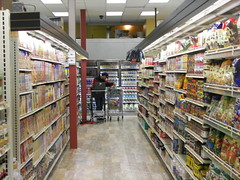
Interior, newly renovated Yes! Organic Market, 3809 12th Street NE
Last year, the Brookland Main Street program successfully initiated the historic designation of the former Newton Theater, now a CVS drug store. This means that the next time the building is renovated, the owners will be able to take advantage of federal historic tax credits (which could total more than one million dollars).
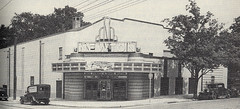
Newton Theater, 1937. Photo courtesy of Robert Headley.
These are but two accomplishments by the Brookland Main Street that demonstrate the kind of creative return on investment yielded by the city’s investment in our program.
Commercial Property Improvements
Last year, 19 commercial properties were renovated on the corridor, representing $1,664,500 in private investment. These projects included 12 façade and sign improvement projects and 11 interior building rehabilitation projects completed (a $1,608,000 investment), which helped to bring vacant properties back to productive use and build-out viable business space to attract new tenants.
Business and Job Creation
In addition to the Yes Market, during calendar year 2006, 3 other businesses opened in our commercial district as well. In total, 53 new jobs were generated by our business attraction activities.
Communications
Part of business development is generating awareness and interest in an area that has been often overlooked. In 2006, the Brookland Main Street program helped place articles in the Washington Business Journal and The Express, and on television, promoting commercial district revitalization and opportunity for development and investment. The circulation and reach of these media outlets yielded over 500,000 impressions that promoted the Brookland neighborhood and commercial district.
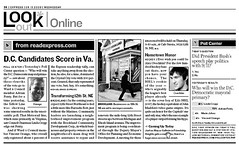
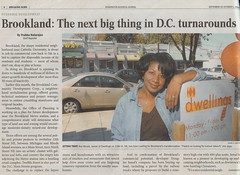
Retail Business Promotion
To promote more shopping in our commercial district by local residents, the Merchants Promotion Committee has developed a postcard mailing program that promotes the commercial district to area residents. For the last two years, the program has mailed during the Christmas Holidays, Valentine’s Day, and Mother’s Day to great success, and we continue to expand this program.
This is complemented by promotion on our www.historicbrookland.org website, on local e-lists and other Internet-based promotion, through the publication of a business directory, co-operative advertising in DC North, media releases, and popular events such as the Brookland Day community festival, and the Holiday Festival of Lights, celebrating Brookland’s tradition of holiday house, yard, and tree lighting.
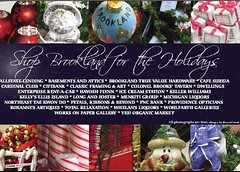
Postcard promotion, Merchants Promotion Committee, Brookland Main Street
2007 going forward
In conjunction with the Restore DC program and the Neighborhood Investment Fund, the Brookland Main Street program is coordinating a façade improvement program for 12th Street NE that will result in a minimum of 14 improved storefronts over the course of 2007, and public and private investment of approximately $400,000.
We are working to strengthen partnerships with local institutions and developers. In part we are doing this through participation in public planning processes initiated by other DC Government Agencies such as the Office of Planning and the Brookland Small Area Planning process (which also involves WMATA and Catholic University ) and the Department of Transportation Streetscape Improvement program.
We are working with our current businesses to strengthen their current retail offer and to identify new opportunities. And we are working to recruit new businesses that will complement and leverage the destination business aspects offered by the Yes Organic Market.
These projects demonstrate the kind of impact that the Brookland Main Street commercial district revitalization has, and why investing in neighborhoods via the DC Main Streets commercial district revitalization program makes sense.
A shopping center has common management, with standardized hours, promotions, and lease provisions. Coordinating a traditional commercial district, with hundreds of stakeholders who have many different ideas on how to proceed is much more difficult. That is the environment in which our Main Street programs work.
But the strength of the city’s Main Street programs is in their diversity—of buildings, people, businesses, neighborhoods, and stakeholders. Each of our commercial districts is unique. Yet each faces great pressure as the city becomes more attractive to investors who all too often have a suburban, rather than urban, idea about how to proceed.
Main Street is a process, not just an end goal, and one that takes many years. Complementary DDOT and Office of Planning plans take years to come to fruition, and require the coordinated activity of business and property owners, DC government agencies, and other stakeholders.
Our challenge is to manage change in a way that benefits all of us—long-tme and new residents, people who want to be able to shop in their own neighborhoods, and those who want to visit and enjoy unique places across the city.
In order to achieve the kind of results that the City Council desires, it is clear that the DC Main Streets program requires stronger financial commitments, increased training opportunities for volunteers, a greater leveraging of the best practices of the individual programs across the city’s other commercial district revitalization programs, and a greater focus on constituency building (such as sponsoring an annual Main Street-business development conference).
Continuing and increasing funding for the DC Main Streets program is one of the best investments that the City can make to ensure the continued livability of its neighborhoods. We ask that the Committee on Economic Development continue and strengthen the commitment to commercial district revitalization, by extending the commitment to fund the DC Main Streets coordinating program and the individual Main Street programs, beyond the initial five year term originally set in 2002.
Thank you.
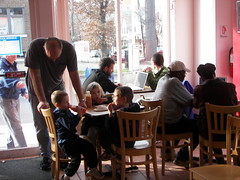
Patrons, Cafe Sureia, 3629 12th Street NE



0 Comments:
Post a Comment
<< Home